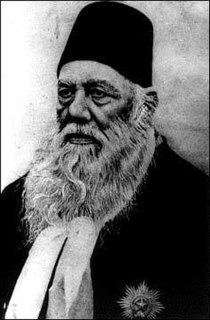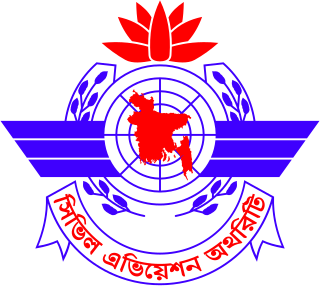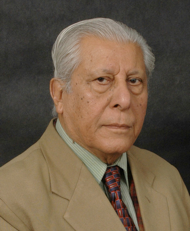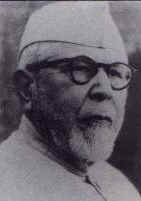
Punjab is a geopolitical, cultural, and historical region in South Asia, specifically in the northern part of the Indian subcontinent, comprising areas of eastern Pakistan and northern India. The boundaries of the region are ill-defined and focus on historical accounts.

Mohammad Abdus Salam, was a Pakistani theoretical physicist. He shared the 1979 Nobel Prize in Physics with Sheldon Glashow and Steven Weinberg for his contribution to the electroweak unification theory. He was the first Pakistani and Muslim to receive a Nobel Prize in science and the second from an Islamic country to receive any Nobel Prize.

Syed Ahmad Taqvi bin Syed Muhammad Muttaqi KCSI, commonly known as Sir Syed Ahmad Khan, was an Islamic pragmatist, Islamic reformer, philosopher, and educationist in nineteenth-century British India. Though initially espousing Hindu-Muslim unity, he became the pioneer of Muslim nationalism in India and is widely credited as the father of Two-Nation Theory which formed the basis of Pakistan movement. Born into a family with strong debts to the Mughal court, Ahmad studied the Quran and Sciences within the court. He was awarded an honorary LLD from the University of Edinburgh in 1889.

From a historical perspective, Professor Ishtiaq Ahmed of the University of Stockholm and Professor Shamsul Islam of the University of Delhi classified the Muslims of South Asia into two categories during the era of the Indian independence movement: nationalist Muslims and Muslim nationalists. The All India Azad Muslim Conference represented nationalist Muslims, while the All-India Muslim League represented the Muslim nationalists.

Sir Ziauddin Ahmad was an Indian mathematician, parliamentarian, logician, natural philosopher, politician, political theorist, educationist and a scholar. He was a member of the Aligarh Movement and was a professor, principal of MAO College, first pro vice-chancellor, vice chancellor and rector of Aligarh Muslim University, India. He served as vice chancellor of Aligarh Muslim University for three terms.
Ziauddin Ahmad Suleri, best known as Z.A. Suleri, was a Pakistani political journalist, conservative writer, author, and Pakistan Movement activist. He is regarded as one of the pioneer of print journalism in Pakistan, and authored various history and political books on Pakistan as well as Islam in the South Asian subcontinent.

Ishfaq Ahmad KhanSI, HI, NI, FPAS, was a Pakistani nuclear physicist, emeritus professor of high-energy physics at the National Center for Physics, and former science advisor to the Government of Pakistan.
Sardar Asif Ahmad Ali Daula is a Pakistani politician who served as the 18th Foreign Minister of Pakistan from 1993 to 1996. He is a senior member of Pakistan Tehreek-e-Insaf and Pakistan Peoples Party. On 25 December 2011, he joined PTI but resigned when party awarded Khurshid Kasuri National Assembly ticket instead of him. He was elected to the National Assembly of Pakistan from Kasur in 1994 and again in 2008 by an impressive margin of ten thousand votes. He has also served as the Minister for Education and Federal Minister of Information Technology and Telecommunication between 2008 and 2010. He rejoined Pakistan Tehreek e Insaf on 10 November 2017 during a press conference with Imran Khan in Lahore.

Abul Hashim was a Bangladeshi politician and Islamic thinker in the Indian Subcontinent.

Civil Aviation Authority, Bangladesh (CAAB) functions as the regulatory body for all aviation related activities in Bangladesh. It is the national aviation authority operating under the Ministry of Civil Aviation & Tourism. All nine operational airports are operated by the CAAB. A member of International Civil Aviation Organization, it has signed bilateral air transport agreement with 52 states. It is headquartered in Kurmitola, Dhaka.
The history of aviation in pre-1947 India began with kites, the traditional heavier-than-air man-made object that is flown by one or more people while staying on the ground. The first recorded manned flight was arranged by the Dhaka Nawab Family in 1882, which resulted in the death of the flyer.

The Pakistan Meteorological Department (PMD), is an autonomous and independent institution tasked with providing weather forecasts and public warnings concerning weather for protection, safety and general information.

Badruddin Tyabji was an Indian lawyer, activist and politician during British Raj. Tyabji was the first Indian to practice as a barrister of the High Court of Bombay who served as the third President of the Indian National Congress. He was one of the founding member and first Muslim president of Indian National Congress.
Badruddin Umar is a Bangladeshi Marxist–Leninist theorist, political activist, historian, writer, intellectual and leader of the Communist Party of Bangladesh (Marxist–Leninist) (Umar). His father, Abul Hashim, was a prominent politician in the Indian subcontinent.

Jamal Khwaja was an Indian philosopher.

Abdul Majeed Khwaja was an Indian lawyer, educationist, social reformer and freedom fighter from Aligarh. In 1920, he along with others founded Jamia Millia Islamia and later served its vice chancellor and chancellor.
Naeem Ahmad Khan, FPAS, was a Pakistani nuclear physicist and a university professor of physics who was known for his work in developing techniques using the solid-state nuclear track detector and solid-state nuclear magnetic resonance.
Tara Chand was an Indian archaeologist and historian specialising in the Ancient History and Culture of India. He taught at Allahabad University and served as Vice-Chancellor in the 1940s.
The Aligarh Movement was the push to establish a modern system of education for the Muslim population of British India, during the later decades of the 19th century. The movement's name derives from the fact that its core and origins lay in the city of Aligarh in Northern India and, in particular, with the foundation of the Muhammadan Anglo-Oriental College in 1875. The founder of the oriental college, and the other educational institutions that developed from it, was Sir Syed Ahmed Khan. He became the leading light of the wider Aligarh Movement.
Muhammad Sulaiman Salman Mansoorpuri also referred as Muhammad Sulaiman Salman or Muhammad Sulaiman Al-Mansurpuri was Islamic scholar, biographer and historian. Sulaiman Mansoorpuri is best known for Rahmatul-lil-Alameen, the biography of the Islamic prophet Muhammad in three volumes. He was also session judge in Patiala State.











